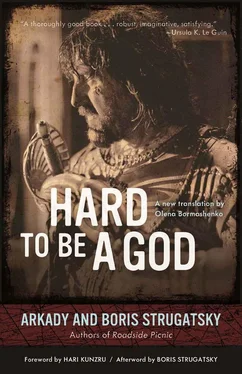Left alone, Rumata pulled up a chair to the window, sat back, and began to watch the city. The prince’s apartments were on a hill, and during the day, you could clearly see the entire city all the way to the sea. But now, everything was sunk in darkness, and the only things visible were scattered groups of lights—the intersections at which the storm troopers were gathered with torches, waiting for a sign. The city was asleep, or pretended to be. I wonder whether the inhabitants feel something horrible looming over them tonight? Or, like the noble don of great sagacity, did they also think that someone was preparing to celebrate the Day of Holy Míca? Two hundred thousand men and women. Two hundred thousand blacksmiths, gunsmiths, butchers, haberdashers, jewelers, housewives, prostitutes, monks, money changers, soldiers, tramps, and surviving bookworms were currently tossing in bedbug-ridden, stuffy beds; sleeping, making love, recalculating profits in their heads, crying, grinding their teeth in anger or resentment. Two hundred thousand people! To a visitor from Earth, they all had something in common. It was probably the fact that almost without exception, they were not yet humans in the modern sense of the world, but blanks, unfinished pieces, which only the bloody centuries of history could one day fashion into true men, proud and free. They were passive, greedy, and incredibly, fantastically selfish. Almost all of them had the psychology of slaves—slaves of religions, slaves of their own kind, slaves of their pathetic passions, slaves of avarice. And if the fates decreed for one of them to be born or become a master, he didn’t know what to do with his freedom. He would again hurry to become a slave—a slave of wealth, a slave of outlandish excesses, a slave of his slaves. The vast majority of them weren’t guilty of anything. They were too passive and too ignorant. Their slavery was the result of passivity and ignorance, and passivity and ignorance again and again breeds slavery.
If they were all identical, there would be reason to throw up your hands and lose hope. But they were still people, the bearers of the spark of reason. And here and there in their midst, the fires of the incredibly distant and inevitable future would kindle and blaze up. They would kindle despite it all. Despite all their seeming unworthiness. Despite the oppression. Despite the fact that they were being trampled with boots. Despite the fact that no one in the world needed them, and that everyone in the world was against them. Despite the fact that at best, they could expect contemptuous, puzzled pity.
They didn’t know that the future was on their side, that the future was impossible without them. They didn’t know that in a world belonging to the terrible ghosts of the past, they were the only manifestation of the future—that they were an enzyme, a vitamin in society’s organism. If you destroy this vitamin, society will rot, and social scurvy will begin: the muscles will go weak, the eyes will lose their sharpness, the teeth will fall out. No country can develop without science—it will be destroyed by its neighbors. Without arts and general culture, the country loses its capacity for self-criticism, begins to encourage faulty tendencies, starts to constantly spawn hypocrites and scum, develops consumerism and conceit in its citizens, and eventually again becomes a victim of its more sensible neighbors. Persecute bookworms all you like, prohibit science, and destroy art, but sooner or later you’ll be forced to think better of it, and with much gnashing of teeth open the way for everything that is so hated by the power-hungry dullards and blockheads.
And no matter how much the gray people in power despise knowledge, they can’t do anything about historical objectivity; they can slow it down, but they can’t stop it. Despising and fearing knowledge, they will nonetheless inevitably decide to promote it in order to survive. Sooner or later they will be forced to allow universities and scientific societies, to create research centers, observatories, and laboratories, and thus to create a cadre of people of thought and knowledge: people who are completely beyond their control, people with a completely different psychology and with completely different needs. And these people cannot exist and certainly cannot function in the former atmosphere of low self-interest, banal preoccupations, dull self-satisfaction, and purely carnal needs. They need a new atmosphere—an atmosphere of comprehensive and inclusive learning, permeated with creative tension; they need writers, artists, composers—and the gray people in power are forced to make this concession too. The obstinate ones will be swept aside by their more cunning opponents in the struggle for power, but those who make this concession are, inevitably and paradoxically, digging their own graves against their will. For fatal to the ignorant egoists and fanatics is the growth of a full range of culture in the people—from research in the natural sciences to the ability to marvel at great music. And then comes the associated process of the broad intellectualization of society: an era in which grayness fights its last battles with a brutality that takes humanity back to the middle ages, loses these battles, and forever disappears as an actual force.
Rumata kept looking at the city, motionless in the dark. Somewhere out there, in a stinking garret, curled up on a pathetic bed, the crippled Father Tarra was burning with fever, and Brother Nanin sat by his side at a wobbly table, drunk, cheerful, and angry—finishing his Treatise on Rumors, using hackneyed phrases with relish to disguise a vicious mockery of gray life. Somewhere out there, Gur the Storyteller was blindly wandering through empty luxurious apartments, realizing with horror that despite everything, some mysterious pressure caused vivid worlds full of remarkable people and extraordinary feelings to burst into his consciousness out of the depths of his torn, trampled soul. And somewhere out there, God knows how, Doctor Budach was whiling away the night—broken down, brought to his knees, tormented but alive. My brothers, thought Rumata. I’m yours, I’m the flesh of your flesh! He suddenly felt with tremendous force that he was no god, shielding the fireflies of reason with his hands, but instead a brother helping a brother, a son saving a father.
I’ll kill Don Reba, he thought. What for? He’s killing my brothers. He knows not what he does. He’s killing the future. It’s not his fault—he’s a product of his time. So he doesn’t know it’s his fault? But does it matter whether he knows it? I know it’s his fault. And what will you do with Father Zupic? Father Zupic would give a lot for Don Reba to be killed…
You’re silent? There are a lot of people you’d need to kill, aren’t there? I don’t know, maybe there’d be a lot. One after the other. Everyone who raises a hand against the future. That’s been done already. They used poison, they threw pipe bombs. And nothing changed. No, things did change. That’s how the strategy for the revolution was created. You don’t need to create a strategy for the revolution. You just want to kill. Yes, I do. And are you capable of it?
Yesterday, I killed Doña Ocana. I already knew that I was killing her when I walked toward her with a feather behind my ear. And the only thing I regret is killing her in vain. So they’ve almost taught me. But that’s bad. That’s dangerous. Remember Sergei Kozhin? And George Lenny? And Sabine Kruger? Rumata passed a hand over his damp forehead. You keep thinking, thinking, thinking like this—and eventually you invent gunpowder…
He jumped up and opened the window. The groups of lights were now in motion, dispersing, lining up, then moving forward, appearing and disappearing between the invisible houses. Some kind of noise sounded above the city—a distant many-voiced howl. Two fires broke out and illuminated the neighboring rooftops. Something blazed up at the port. Things were developing. In a few hours he would know the meaning of the alliance between the gray army and the night army, the unnatural accord between shopkeepers and highway robbers; he would learn what Don Reba was trying to do and what new provocation he had conceived. Or, to put it simply: who was being slaughtered today. Chances were that it was the beginning of a Night of the Long Knives, which would see the destruction of a gray leadership that had gone too far, accompanied by an extermination of the barons who happened to be in town and the most inconvenient of the aristocrats. I wonder how Pampa is doing, he thought. If he’s not sleeping, he’ll fight them off.
Читать дальше












